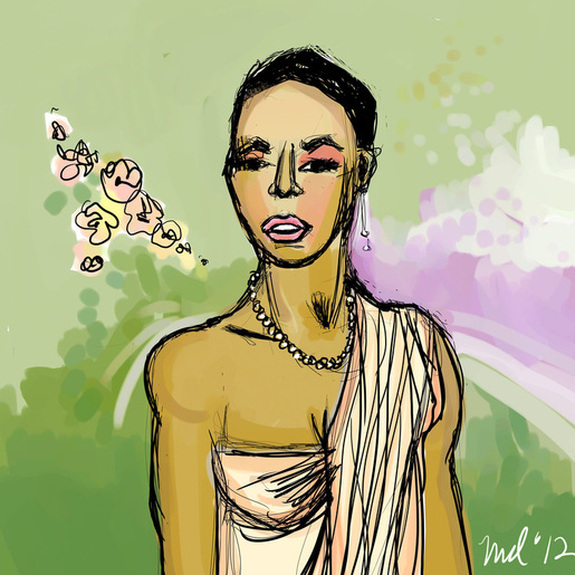I was at dinner with my partner and friends – we had just been sat. As I returned from the restroom everyone had their Smartphone out and stunned looks on their faces. It is the kind of news you have to tell, and they did. My stomach fell. I didn't know why this affected me so much; is it because she had been with us for so long? I can personally attest that “I Wanna Dance With Somebody (Who Loves Me)” inspired sensations of murder in me – they played that thing relentlessly. It was goody-goody and hard driving at once. I cannot have been alone in this. Still I was deeply affected at her passing.
She had actually already lost the voice – that beautiful voice – years earlier. For her last “comeback” record (I Look To You, 2009) she could sadly no longer hit the 2nd and 3rd registers of her famous 3 octave range. Maybe this was when it set in that I missed her, not because I had loved her so much in the 80s (I remember how sparkling her first single sounded as a teen driving to the beach, but let’s be honest, most of it was cheesy to me), but because someone great had left the room. Just like Michael Jackson, it is very easy to take a gift for granted when it is delivered so effortlessly and with such command. Whitney, even at the end, never sang a song she did not positively own. She was a pro.
I think that her best period, her prime, is The Bodyguard /Waiting To Exhale period. I have read and heard a lot of interesting discussion on just what Houston did to the style of music after 1985 (and the many successive acolytes starting with Mariah Carey). Basically she made polite ballads popular again. Songs of love and longing, never lust, and certainly not revenge. That is why they were corny to a teenage me. By the time of The Bodyguard her style had matured and became smokier. The songs were at once more demanding (“I Have Nothing”) and less fussy (“I Will Always Love You”). It began a period of more stripped down material that let to one of her finest moments, “Exhale (Shoop Shoop)”, a winding and conversational moment for her. It was clearly the work of an adult, a mature woman, and an artist in her prime. It shows no production, there are no fingerprints on it, it is just her. I had always imagined she produced it herself.
And at the height of her beauty, talent and fame she met and married Bobby Brown. This is what haunts us still, the fact that she sullied a perfectly constructed image, first as America’s sweetheart, then our favorite soul diva. I had always been aware of the other Whitney, a fiercely combative interviewee, with a very haughty and testy persona. There was always confrontation and danger in those eyes, no? She had the haughtier of a queen. The marriage and drug abuse only exaggerated what we already knew. It made her fall from grace seem like a natural devolution. I have heard her say that she never felt like a real person until she met Bobby Brown – because he wanted her so directly. In so defined a person this was bound to create two versions- good Whitney and bad Whitney, the public and the private. Our fascination at her passing is in this dichotomy: we cannot believe that something so young and fresh had changed, and then passed. It is the American way that we push our heroes to the brink.
As there are no accidents, perhaps she was waiting to exhale and she actually did want to dance with somebody who loved her. It is sad that it led her down such a long and destructive path. But it is worthy of her that we must now piece it all back together: old Whitney, young Whitney, crack head Whitney, and that impossibly fresh smiling lovely young girl who enchanted us all. As the story unfolds for us one thing is certain: those “cheesy” safe ballads have more than stood the test of time. In their very accessibility they had hidden an absolute master of American song.


 RSS Feed
RSS Feed
